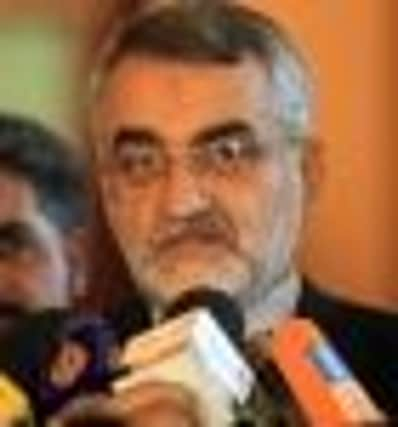Diplomats make progress in ‘more positive’ talks on Iran’s nuclear plans


However, in a reality check reflecting the gulf dividing the West and Iran, a powerful Iranian official said his country had rejected an overture from Washington for a one-on-one meeting between the two delegations at the talks.
“No bilateral talks with the US will be formed,” said Alaeddin Boroujeddi, head of Iran’s powerful parliamentary committee on national security and foreign policy.
Advertisement
Hide AdAdvertisement
Hide Ad“It is not Iran’s policy to have bilateral talks with the US. Iran will talk to them on the multilateral level.”
Iran and the United States have not had diplomatic ties for 33 years, since militant Iranian students took American diplomats hostage in Tehran, and relations have faced additional tensions since.
Diplomats cautioned against premature optimism about the outcome. Still, they said, the unfolding dialogue between the two sides suggested they would find enough common ground for a second round in several weeks’ time.
Iran is under four sets of UN sanctions for refusing to stop uranium enrichment – which can be used both to make reactor fuel and the fissile core of nuclear warheads – and the international community continues to demand that Tehran stop the activity.
The last set of nuclear talks broke up without result more than 14 months ago, after the Iranian team had refused to even discuss enrichment. The six had come to yesterday’s meeting with more modest expectations. Diplomats said before the meeting began that even general Iranian readiness to accept the need to discuss its enrichment programme would be considered enough of a success to warrant a follow-up round.
One of the diplomats said the Iranians appeared to be moving towards that goal, engaging in discussion about the peaceful use of nuclear energy and the Nuclear Nonproliferation Treaty.
He said the Iranian team had mentioned supreme leader Ayatollah Ali Khamenei’s “fatwa”, or prohibition, of nuclear weapons for Iran, in the course of the plenary discussions. After lunch, the meeting would go into bilateral sessions, he said – a set-up that will be closely watched to see if the Americans meet directly with the Iranians.
Such encounters are rare and would indicate a further thaw in tensions at the talks.
Advertisement
Hide AdAdvertisement
Hide Ad“I would say there was a very constructive atmosphere compared to last time, generally a positive vibe,” he said. “The principle seems to be there for future negotiations.”
Another diplomat described the just-completed session as a “useful morning’s work”, saying the Iranians appeared to be looking for a “serious process” at the talks. Iran insists it has no nuclear weapon ambitions, but the international community fears it could use its uranium enrichment programme not only to make reactor fuel but also the fissile core of nuclear weapons.
Ahead of the meeting, European Union foreign policy chief Catherine Ashton, who i s the facilitator for the six nations engaging with Iran, expressed hope that it will be “the beginnings of a sustained process” in a statement whose language reflected the meeting’s main goal: establishing enough trust to keep the process going.
“What we are here to do is to find ways in which we can build confidence between us and ways in which we can demonstrate that Iran is moving away from a nuclear weapons programme.”
For his part, chief Iranian negotiator Saeed Jalili said the talks “will serve the dignity of the Iranian nation”.
Officially, the international community’s long-term goal remains what it was when nuclear negotiations began eight years ago: persuading Tehran to stop all uranium enrichment and thereby relieve fears that it will use that programme to create the fissile core of nuclear warheads. Tehran has long denied any weapons-related nuclear goals.